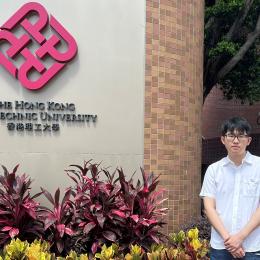Sept 2026 Entry
4 years (including 1 year with common curriculum)
At least 120, depending on the student's qualifications (plus 2 training credits)
Students will receive one of the following awards upon completion of the programme:
- BSc (Hons) in Applied Mathematics
BSc (Hons) in Investment Science and Finance Analytics
BSc (Hons) in Quantitative Finance and FinTech
Students may enrol in any awards without being subject to further assessment.
The option of a Secondary Major in AI and Data Analytics (AIDA) is available to students taking the BSc (Hons) in Applied Mathematics and BSc (Hons) in Investment Science and Finance Analytics. Admission to the Secondary Major is on a competitive basis and is subject to a different credit requirement for graduation. Please see the Secondary Major Details section below for further information.
Students may also choose to pursue a Double Major, adding a Second Major from another department within the Faculty of Computer and Mathematical Sciences to their studies. This option gives students the chance to broaden their academic experience and earn two awards when they graduate. Admission to the Double Major is competitive and requires a different credit requirement for graduation.
For more Scheme information, please visit https://www.polyu.edu.hk/ama/study/ug/amfa/.
What's New

- Undergraduate

- Undergraduate
All admitted students will embark on a Common Year One curriculum. Towards the end of year one, students can decide whether to continue with their initial choice or switch to another choice within the Faculty of Computer and Mathematical Sciences. Those who wish to change to another choice need to join a competitive process through a ranking assessment, which considers a combination of entrance qualification score, Year One GPA, and interview performance.
This 4-year full-time Scheme is designed to nurture future finance analysts, FinTech professionals and applied mathematicians with solid training in mathematical and statistical skills coupled with computer programming techniques, with a special emphasis on interdisciplinary applications in investment and finance. This Scheme integrates key finance analytics, quantitative finance and FinTech elements and essential mathematical and statistical training to prepare students to pursue careers in the evolving digital finance landscape or to further their studies in related fields. The Scheme consists of the following three major programmes:
BSc (Hons) in Applied Mathematics equips students with solid knowledge in differential equations, statistical analysis, computational methods, mathematical modelling, optimisation, operations research and financial mathematics. It is suitable for students who intend to further their studies or pursue their careers in other sectors.
BSc (Hons) in Investment Science and Finance Analytics is concerned with the strategic use of data and mathematical modelling in financial analysis and investment decision-making. The programme aims to cultivate investment and finance professionals with strong quantitative analysis, critical thinking and communication skills, preparing them for careers in different finance sectors such as investment banking, fund management, risk management and financial product development and pricing.
BSc (Hons) in Quantitative Finance and FinTech is concerned with the strategic use of IT technology to integrate FinTech elements such as blockchain technology, information security, algorithmic trading, robo-advising, deep hedging and various applications of machine learning as well as for reinforcement learning in finance.
Career Prospects
The Scheme is meticulously designed to elevate students' analytical, critical thinking, problem-solving and communication skills, and it cultivates methodologies that equip graduates for a wide array of careers in sectors such as investment banking, quantitative finance, fintech, risk management, financial product development and pricing, and fund management, as well as in other domains such as telecommunications, information technology, market research and pharmaceuticals. In addition, many graduates have pursued further studies in overseas, attending renowned institutions such as Oxford University, Cambridge University, Yale University, and Columbia University to pursue Master's programmes. For students planning to pursue advanced studies or careers in different fields, Applied Mathematics can provide a robust foundation in financial mathematics, statistical analysis, computational methods, mathematical modeling, optimisation, operations research and differential equations.
Professional Recognition
On the completion of the BSc (Hons) in Investment Science and Finance Analytics (ISFA) programme, graduates are expected to receive recognition or partial exemption from the professional assessment of:
1. Chartered Financial Analyst (CFA) Institute*
2. Hong Kong Securities and Investment Institute (HKSI)^
3. Hong Kong Statistical Society (HKSS) (Subject to confirmation)
4. Royal Statistical Society of the UK (Subject to confirmation)
*The ISFA programme is affiliated with the CFA Institute University Affiliation Program. This affiliation demonstrates that the ISFA curriculum is closely tied to professional practice and is well-suited to prepare students to sit for the CFA examinations. The curriculum has been acknowledged as covering at least 70% of the CFA Program Level I Candidate Body of Knowledge (CBOK) topics. CFA student scholarships are available to ISFA students through participation in the affiliation programme.
^Graduates with an economic/finance or relevant degree qualification can apply for a license by passing Licensing Examination for Securities and Futures Intermediaries Paper 1 only and will be exempted from Papers 7 & 8. Students should submit their applications to HKSI. Exemptions will be considered for candidates who achieve satisfactory results in specified papers. For details, please visit this link.
All students admitted to the Scheme take a common set of subjects in their first year and select one of the Majors under the Scheme in their second year.
Year 1: All students admitted to the Faculty of Computer and Mathematical Sciences will follow a Common Year 1 curriculum with some subjects of the General University Requirements (GUR).
Year 2: Students are streamed into one of the three Majors under the departmental scheme based on their selection. They continue to complete subjects common to the departmental scheme, as covered by the following modules: Introduction to Statistics, Applied Linear Models and Operations Research Methods. Students start to study major discipline-specific compulsory subjects in Applied Mathematics, Investment Science and Finance Analytics or Quantitative Finance and FinTech.
Year 3: Students are expected to complete most of the major discipline-specific compulsory subjects. This includes subjects such as Real Analysis, Differential Equations and Complex Variables for the Applied Mathematics programme; Corporate Finance, Theory of Interest and Portfolio Analysis, Investments, Derivative Pricing and Econometrics for the Investment Science and Finance Analytics programme; and Introduction to Blockchain and Cyber Security, Quantitative Finance and Financial Technology, Computer Systems Security and Machine Learning for the Quantitative Finance and FinTech programme.
Year 4: Students enjoy the flexibility of selecting major discipline-specific elective subjects from a diverse pool encompassing applied mathematics, finance and investment, statistics, data science, computing science and fintech. Additionally, they undertake a Capstone Project focusing on a problem or research topic within finance analytics, quantitative finance, fintech, statistics or applied mathematics. This project consolidates the discipline-specific knowledge, conceptual understanding and generic skills they have cultivated throughout various stages of the programme.
For details, please refer to the following website: https://www.polyu.edu.hk/ama/study/ug/amfa/.
Options for Double Major
Students interested in expanding their studies beyond a single degree may apply for a Second Major from another department within FCMS. To be eligible for consideration, students must achieve a cumulative GPA of 3.00 or above at the end of Year 1. The total credit requirements of a Double Major depend on the degree of commonality between the 2 Majors, typically between 136 – 161 credits. Students will receive two award parchments upon successful completion of the Double Major programme.
The following Double Major study options are available:
1. Applied Mathematics + Computer Science
2. Applied Mathematics + Enterprise Information Systems
3. Applied Mathematics + Financial Technology and Artificial Intelligence
4. Investment Science and Finance Analytics + Computer Science
5. Investment Science and Finance Analytics + Enterprise Information Systems
6. Investment Science and Finance Analytics + Financial Technology and Artificial Intelligence
7. Quantitative Finance and FinTech + Computer Science
8. Quantitative Finance and FinTech + Enterprise Information Systems
Fast-track Integrated Bachelor’s and Master’s Degree Programme
The AMA fast-track programme enables high-achieving students to complete both undergraduate and taught postgraduate studies in a shorter time frame with reduced tuition fees. Students may join in Year 1 or Year 3, based on academic standing. The programme allows up to 30% of postgraduate credits to be double-counted. Graduates receive two parchments, boosting their qualifications and career prospects in finance and analytics:
Visit www.polyu.edu.hk/ama/study/ug/fast-track-programme-isfa/ for details.
The option of a Secondary Major in Artificial Intelligence and Data Analytics (AIDA) is available to students of BSc (Hons) in Applied Mathematics and BSc (Hons) in Investment Science and Finance Analytics.
Selection Criteria
Studying a Secondary Major is not mandatory. Only students with a cumulative GPA of 2.70 or above may be considered for Secondary Major enrolment. Each Secondary Major may stipulate additional selection criteria for admission. To be admitted to the Secondary Major, students must apply to and obtain approval from the programme-offering Department no later than the commencement of the second year of study.
Credit Requirements
Students are required to attain 36 credits to complete a Secondary Major. The actual credit requirement for graduation for students of BSc (Hons) in Applied Mathematics and BSc (Hons) in Investment Science and Finance Analytics with a Secondary Major in AIDA depends on the number of double-counting credits.
Professional Accreditation
Graduates of the ISFA + AIDA stream are accredited by the Chartered Financial Analyst (CFA) Institute, the Hong Kong Securities and Investment Institute (HKSI), the Hong Kong Statistical Society (subject to confirmation) and the Royal Statistical Society of the UK (subject to confirmation).
For the curricula of Secondary Majors, please refer to this page for AIDA.
At least 120, depending on the student's qualifications (plus 2 training credits)
Scheme Leader
Professor Sze Nung-sing, Raymond
BSc, MPhil, PhD
Assistant Scheme Leader
Dr Lee Kei-fung, Charles
BSc, PhD, PGDE, MABS
Please click here to view the entrance requirements for international applicants.
Other Information
-
Applicants with good results in public examinations/post-secondary qualifications in English Language and Mathematics are preferred.
For further programme information, please contact the General Office (tel.: 2766 6946; email: amfa.info@polyu.edu.hk).
To evaluate applicants' potential and interest in the Scheme and to test their communication skills and general knowledge for applied mathematics/investment science and finance analytics/quantitative finance and fintech.
About 30-45 minutes
Suitable candidates may be invited for interviews.
Required
To evaluate applicants' potential and interest in the Scheme and to test their communication skills and general knowledge for applied mathematics/ investment science and finance analytics/ quantitative finance and fintech.
About 20-30 minutes
-
Only selected applicants will be invited to interviews. No make-up interviews or earlier interviews will be arranged for applicants who fail to attend the scheduled interviews.
Required
To evaluate applicants' potential for and interest in the Scheme and to test their communication skills and general knowledge of applied mathematics/ investment science and finance analytics/ quantitative finance and fintech.
About 20-30 minutes.
Only selected applicants will be invited to interviews. No make-up interviews or earlier interviews will be arranged for applicants who fail to attend the scheduled interviews.










